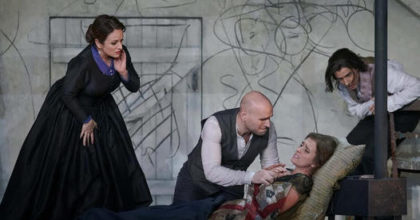It is no secret that Albanian soprano Ermonela Jaho is one of the best singers/actresses currently active

It is no secret that Albanian soprano Ermonela Jaho is one of the best singers/actresses currently active. She had already debuted at Teatro Real her signature roles of Violetta and Butterfly with immense success, and the frail, infatuated bohemian Mimi turned out to be another of her great roles. She enters in Act one, in spite of initially fainting, flirtatious and lively. There are signs of her sickness already: the suffocated breath and shaking hands, but Jaho does not overload the dramatic signs of Mimi’s sickness. She presents a sympathetic, lovely young girl. She sang her aria “Si, mi chiamano Mimi“ with joy, navigating easily through Puccini’s long, expansive lines and emitting a beautiful high A pianisimi on “di primavera.” She was triumphantly passionate in the final Act one duet “O soave fanciulla,” singing a perfect long sustained high C offstage. She maintained this sense of youth, life and love throughout the second act, where Mini is relegated to a few spare lines.
It was in Act three where Jaho revealed her dramatic powers. The scene with Marcello was breathtaking as she expressed the pain of the difficult romantic situation she is experiencing with Rodolfo, with strong high B flats in “il mio Rodolfo.” The interpretation of her aria “Donde lieta usci“ was extremely moving, and the soprano delivered a study in emotional constraint rather than overacting the drama.
By the time the audience reached Act four all could confidently conclude that the soprano had no competitors and was the star of the show. Her portrayal of the deathly ill young woman is, simply put, incredibly moving and believable. Jaho’s hands shake terribly when she expresses that she feels cold, and this was the first time that I have actually seen a soprano physically shaking from cold in that scene. Jaho gives herself up herself completely to the scene, to the point that you forget she is singing, as she colors her voice to reinforce the illusion of her death. Jaho succeeded once again with her characterization of a doomed heroine, with her clever way of building the drama and the sickness rather than playing the obvious from the very beginning.
Jaho made you cry at the end because she made you laugh during the first two acts.
Please follow and like us: